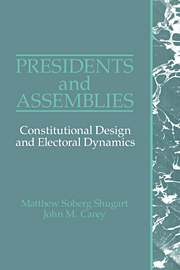Book contents
- Frontmatter
- Contents
- List of tables and figures
- Acknowledgments
- 1 Basic choices in democratic regime types
- 2 Defining regimes with elected presidents
- 3 Criticisms of presidentialism and responses
- 4 The premier-presidential and president-parliamentary experiences
- 5 The constitutional origins of chief executives
- 6 Constitutional limits on separate origin and survival
- 7 Legislative powers of presidents
- 8 Assessing the powers of the presidency
- 9 Electoral dynamics: efficiency and inefficiency
- 10 Electoral rules and the party system
- 11 Electoral cycles and the party system
- 12 Electoral cycles and compatibility between president and assembly
- 13 Conclusions
- Appendix A Electoral rules for one-seat districts and coalition-building incentives
- Appendix B Theoretical explanation for models predicting number of parties in presidential systems
- Bibliography
- Index
13 - Conclusions
Published online by Cambridge University Press: 05 June 2012
- Frontmatter
- Contents
- List of tables and figures
- Acknowledgments
- 1 Basic choices in democratic regime types
- 2 Defining regimes with elected presidents
- 3 Criticisms of presidentialism and responses
- 4 The premier-presidential and president-parliamentary experiences
- 5 The constitutional origins of chief executives
- 6 Constitutional limits on separate origin and survival
- 7 Legislative powers of presidents
- 8 Assessing the powers of the presidency
- 9 Electoral dynamics: efficiency and inefficiency
- 10 Electoral rules and the party system
- 11 Electoral cycles and the party system
- 12 Electoral cycles and compatibility between president and assembly
- 13 Conclusions
- Appendix A Electoral rules for one-seat districts and coalition-building incentives
- Appendix B Theoretical explanation for models predicting number of parties in presidential systems
- Bibliography
- Index
Summary
This book has been devoted to the study of those democratic constitutional designs in which there are two agents of the electorate. The common idealtypical parliamentary regimes have only one such agent, the assembly, which in Linz's expression, is “the only democratically legitimated institution” (Linz 1987:5). Many other democratic regimes provide for two agents of the electorate, one of which is the assembly, while the other is a president with some power over the composition of governments or legislation, or both. Wherever the electorate has two agents, it becomes critical for the relative powers to be spelled out clearly in the constitution. We have seen a great range of powers provided in actual constitutions featuring popularly elected presidents.
In considering different constitutional designs, we have stressed that among the purposes of democratic institutions is to provide what Powell (1989) refers to as “citizen control” over representatives. Citizens may control their representatives through elections according to two basic models. The first provides that voters should have the ability to assess clear responsibility on the part of an incumbent government and either return it to power or toss it out in favor of an alternative government. Institutions that provide voters this form of control are deemed to provide electoral efficiency. A second basic model of citizen control assumes that voters should have a large menu of partisan choices from which to select, in order that nearly every voter has a party close to his or her ideal policy point.
- Type
- Chapter
- Information
- Presidents and AssembliesConstitutional Design and Electoral Dynamics, pp. 273 - 287Publisher: Cambridge University PressPrint publication year: 1992
- 1
- Cited by

